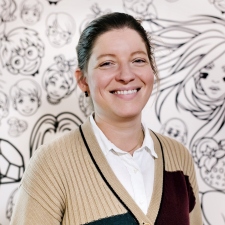Especially for International Womens Day (and continuing all week) we’ve created a series of interviews to co-incide with the annual celebration of women’s achievements all around the world.
There’s great advice for women who want to be part of the gaming world and we find out what’s changed, what’s changing and what still needs to change if women’s voices are to be heard and gaming is to become more inclusive, more entertaining and more engaging for everyone.
Kicking off our series of interviews, we spoke with Victory Trofimova, co-founder and CEO of Nordcurrent, the publisher of casual games for phones, tablets, and desktop, headquartered in Lithuania. Nordcurrent has development studios in Vilnius, Odesa, Dnipro, and Warsaw and during the last 20 years has developed over 50 games for various platforms including their biggest hit Cooking Fever with almost 400 million downloads and 10 million monthly active users.
Firstly, tell us about your work at Nordcurrent
Victoria Trofimova: I’m the CEO of Nordcurrent and we established the company in 2002 with a dream to develop video games. Today Nordcurrent is the biggest game development studio in Lithuania and the Baltic countries, with over 270 employees and offices in Vilnius, Dnipro, Odesa, and Warsaw. I am responsible for leading Nordcurrent, balancing the company’s overall strategic direction, supporting existing games, launching new ones, and planning and implementing acquisitions.
What made you want to work in games?
I started developing games as a student, and we established Nordcurrent right after graduating from university. My first job was to secure a publishing agreement for our first game, Santa Claus Saves the Earth. Making games was my childhood dream, so I just followed it.
Do you feel like attitudes towards female gamers and women working in games have changed and are changing?
Certainly, now there are more females in the gaming industry than 20 years ago. Also, the variety of roles women take in game development companies is broader. In the early 2000s, women were mostly involved in administration and support roles. Today there are women successfully taking varied roles in game development.
The whole industry has changed in a similar way. Now we see more women playing games. Games have become accessible to wide audiences with the arrival of new platforms, devices, and casual games. The diversity increased dramatically not only across genders but also across age groups.
What do you think having more women in games brings to the industry and the games we make?
Diversity brings better solutions through differences in opinions and attitudes. Diversity also brings a healthier culture to a company, where each employee feels comfortable and safe. Diversity makes our games better and allows us to cater to different audiences. Again this is not just about gender but multidimensional diversity.
What’s the road ahead? How can we encourage more women to get involved and make a difference?
Employers must nurture a culture of inclusivity within the office/workplace. Ensure all employees feel comfortable and everyone’s opinion is heard and valued.
Looking more strategically, game development companies should find the right way to approach the educational system, to introduce the amazing possibilities in the gaming industry.
Gaming has become mainstream entertainment, like music, cinema, or TV. It is consumed by the majority of people and visible to entirely anyone. New generations then naturally include an option of game development among their dream professions. Our job is to support their choice by showing examples of women in gaming development striving, succeeding, and living happy lives.

